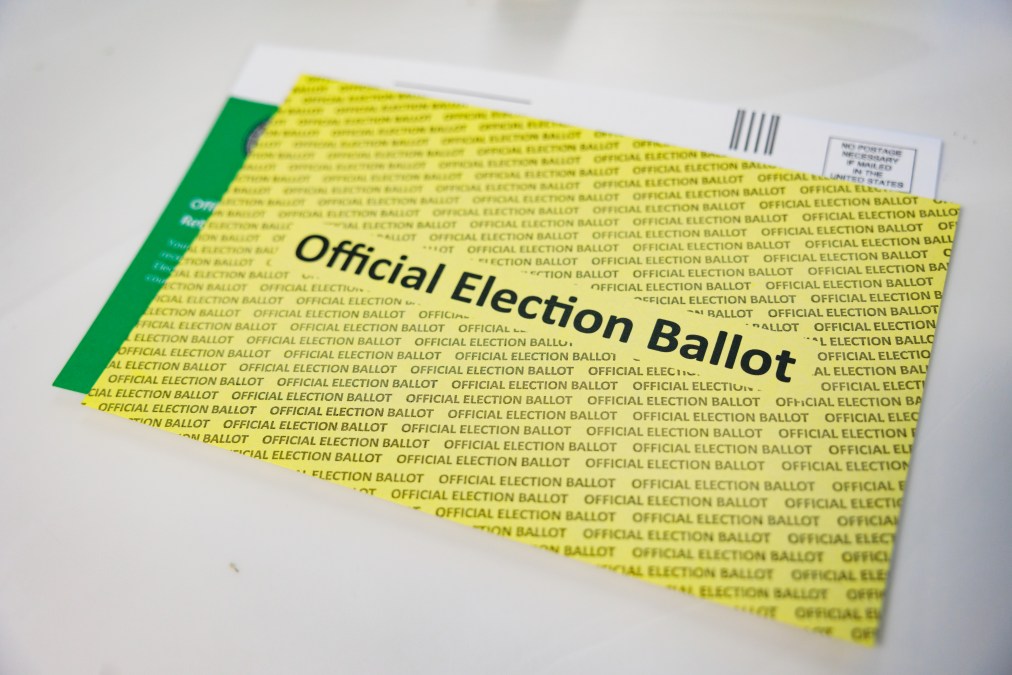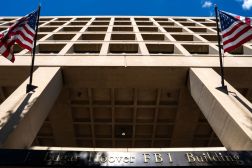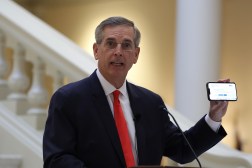Pennsylvania officials rebut false voter fraud claims from home and abroad

An elections office in key presidential swing state Pennsylvania said a video circulating online this week purporting to depict the destruction of valid ballots is fake, and federal officials and a prominent disinformation researcher attributed the effort to Russian actors.
The video appeared on X and other social media sites this week showing an unidentified individual opening envelopes with a Bucks County, Pennsylvania seal and an “Official Election Ballot” label and cursing Republican presidential candidate Donald Trump before ripping up ballots with his name filled in. The video also depicts the person opening up ballots and then carefully placing them back in their envelopes after seeing they were “for Kamala,” referring to Democratic candidate Vice President Kamala Harris.
The Bucks County Board of Elections quickly responded, putting out a bipartisan statement Thursday unequivocally calling the video a fake and noting that both the envelopes and other documents depicted in the video “are clearly not materials belonging to or distributed by the Bucks County Board of Elections.”
“This type of behavior is meant to sow division and distrust in our election systems, and make a mockery of the people working incredibly hard to ensure a free and fair election is carried out,” wrote board chair Bob Harvie, vice chair Diane Ellis-Marseglia and board member Gene DeGirolamo.
After CyberScoop’s story published, the Office of the Director of National Intelligence, the FBI and the Cybersecurity and Infrastructure Security Agency released a joint statement assessing “that Russian actors manufactured and amplified” the Bucks County video “as part of Moscow’s broader effort to raise unfounded questions about the integrity of the U.S. election and stoke divisions among Americans.”
Meanwhile, a researcher and academic who first connected a manipulated video of a former student accusing Minnesota Gov. Tim Walz, the Democratic vice presidential candidate, of sexual abuse to Russian disinformation groups said some of the same actors are behind the ballot destruction video.
Darren Linvill, a professor at Clemson University and co-director of the Media Forensics Hub, a research center that studies disinformation, said that the video is part of “narrative” set by Storm-1516, a Russian-backed troll farm.
“Yes, this video showing mail-in ballots being destroyed in Bucks County, [Pennsylvania] is fake. And yes, its [sic] the Russians,” Linvill wrote Wednesday on X, noting that the fake video and claims received tens of thousands of shares just hours after going up.
In an email exchange with CyberScoop, Linvill expanded on those claims, saying his team has tracked Storm-1516 since last year and that a number of details in the Bucks County video and the way it was initially spread align with previous content produced by the group.
The original post sharing the video, from an account on X called @TheWakeninq, was later deleted, and the account subsequently retweeted several other tweets noting that the video was fake. But Linvill said the account is a key cog in Storm-1516’s content distribution network with a history of boosting the group’s narratives at early stages.
“There are a few little tells that suggest this is Russian (the West African actor, for instance, [was] likely hired from the St. Petersburg [Russia] immigrant community). The most important tell, however, is the source,” said Linvill. “TheWakeninq originated this video on X and is part of the Storm distribution network. He has consistently shared narratives. In fact, he shared the VERY FIRST Storm-1516 narrative back in August 2023.”
Storm-1516 has persistently targeted U.S. audiences with disinformation campaigns over the past year, focused on both laundering anti-Ukraine narratives into American political discourse and, according to U.S. intelligence agencies, attempting to once again boost the electoral prospects of Trump, mainly through false claims about the Harris-Walz ticket.
One of the group’s primary tactics is the use of staged or fake videos depicting scandalous or illegal behavior, such as the Walz hoax and a staged video depicting Harris being involved in a hit-and-run.
Bucks County District Attorney Jennifer Schorn said an investigation by her office concluded that the video was “fabricated” and designed to influence perceptions about the integrity of the upcoming elections. She also indicated that federal authorities are looking into the matter.
“Our office is in contact with the Federal Bureau of Investigation who will be attempting to locate the source of this manufactured video,” Schorn said in a statement.
The FBI did not respond to a request for comment.
Conservative door-knocker spreads unfounded claims of mass nun-led voter fraud
At virtually the same time Bucks County officials were fending off a reported influence campaign from Russia, Pennsylvania state officials moved to debunk another false viral voter-fraud claim spreading in their state, this time coming from sources much closer to home.
On Oct. 22, Cliff Maloney, founder of The Pennsylvania Chase, a pro-Trump door-knocking initiative that is not formally connected to the Trump campaign, posted claims online that an address with 53 registered voters belonging to the Benedictine Sisters of Erie was empty and “NO ONE lives there.”
“Our attorneys are reviewing this. We will not let the [Democrats] rely on illegal votes,” Maloney wrote.
On Thursday, the Benedictine Sisters of Erie responded, saying Maloney’s claims were “blatantly false.”
“We want to call Cliff Maloney to account for his blatantly false post that accuses our sisters of fraud. We do live at Mount Saint Benedict Monastery and a simple web search would alert him to our active presence in a number of ministries in Erie,” prioress Sister Stephanie Schmidt wrote. “We also want to alert those who subscribe to X and other social media platforms to be vigilant and seek additional information before accepting these posts as truth.”
Democratic Pennsylvania Governor Al Schmidt publicly thanked the group for “standing up to election disinformation.”
Maloney’s original post claiming fraud remains up on X. He later wrote that his claim was part of a good faith effort to ensure fair elections and that “if the 53 people registered at this address are legal voters… then I encourage them to participate in their right to vote” while adding “once we have proof, we will be content.”
Pennsylvania is considered by polling and election forecasters as the state most likely to tip the presidential election. It was carried by the eventual winners of the past two presidential elections, and polling averages show a race between Trump and Harris that is within the margin of error.
That reality has put the Keystone State firmly in the crosshairs of both foreign and domestic disinformation campaigns, and U.S. intelligence, election officials and experts have warned that false claims and manufactured evidence of voter fraud and noncitizen voting are likely to flood states like Pennsylvania both leading up to election day and afterwards as states move to finish vote counting and certify election results.
“The intelligence community expects foreign influence efforts will intensify in the lead up to election day, especially through social media posts, some of which are likely to be AI-generated or enhanced, based on newly available intelligence,” an official with the Office of the Director of National Intelligence told reporters this week.
The official added that in the period after voting day on Nov. 5, countries like Russia, China and Iran “probably will be quick to create false narratives or amplify content they think will create confusion about the election ,such as posting claims of election irregularities.”
This story was updated Oct. 26, 2024, with a statement from the FBI, ODNI and CISA attributing the fake video to Russian actors.






